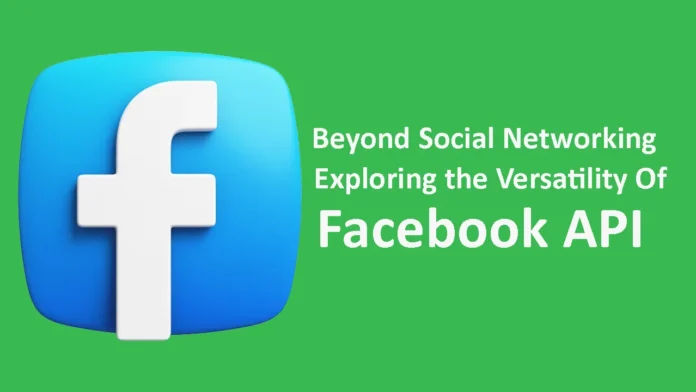In the digital age, Facebook is more than just a social networking platform. With over 2.8 billion active users, it has evolved into a robust ecosystem, fostering a wide array of applications. At the heart of this evolution is the Facebook API, a tool that allows developers to tap into the platform’s vast resources. This article delves into the versatility of Facebook API, illustrating how it extends beyond social media interactions and exploring its applications across multiple platforms.
Expanding Horizons: Facebook API Beyond Social Media Interactions
The Facebook API, or Application Programming Interface, is a set of rules and protocols that allows third-party applications to interact with Facebook. While it’s largely associated with social media interactions, its potential extends far beyond, offering a versatile toolbox for developers to create innovative solutions that harness the power of Facebook’s expansive user base and rich data streams.
The Facebook API has been leveraged for various applications, from integrating Facebook login functionality into websites and mobile apps, to enabling automated posting and messaging, to gathering user data for personalized advertising and market research. All these applications serve to create a more seamless, interconnected digital experience for users, while providing businesses with valuable insights and engagement opportunities.
However, the true versatility of the Facebook API lies in its adaptability. The API has been designed to be flexible and scalable, catering to a wide range of applications and platforms. This adaptability extends further into the realm of artificial intelligence, machine learning, and big data analytics, allowing developers to build sophisticated applications that can analyze user behavior, predict trends, and deliver personalized content.
Multi-Platform Integration: Leveraging Facebook API Across Diverse Applications
The Facebook API’s ability to integrate with various platforms is among its most powerful features. This versatility allows developers to leverage Facebook’s resources across a wide array of applications, from mobile apps and websites to e-commerce platforms, collaborative tools, and even Internet of Things (IoT) devices.
One common example of this is the integration of Facebook login functionality into third-party apps and websites. By allowing users to log in with their Facebook credentials, developers can simplify the registration process, enhance user engagement, and gain access to valuable user data for personalized services.
Furthermore, the Facebook API can be used to integrate social features into third-party applications. This might include sharing content on Facebook from within the app, displaying a user’s Facebook friends list, or even creating a social gaming experience where users can compete against their Facebook friends. These features not only enhance the user experience but also promote social engagement and increase the app’s visibility.
Apart from these, the Facebook API has been instrumental in powering up IoT devices. By integrating Facebook functionalities into smart devices, developers can create personalized user experiences, drive user engagement, and even enable social interactions through these devices.
E-Commerce Applications: Enhancing Online Shopping Experiences with Facebook API
The emergence of e-commerce has revolutionized the retail industry, and the Facebook API has played a crucial role in this transformation. It’s been leveraged to enhance online shopping experiences, facilitate secure transactions, and deliver personalized advertising.
Through the Facebook API, online retailers can integrate social sharing features into their websites, allowing customers to share their favorite products with their Facebook friends. This not only boosts brand visibility but also leverages the power of social proof, as customers are more likely to purchase products recommended by their friends.
Moreover, the Facebook API enables e-commerce platforms to tap into Facebook’s rich user data. This allows them to deliver personalized product recommendations, targeted advertising, and even predictive shopping experiences that anticipate customers’ needs. The result is a more engaging, personalized shopping experience that drives customer loyalty and increases sales.
The Facebook API has also been used to facilitate secure online transactions. By integrating Facebook Pay into their platforms, online retailers can offer a secure, convenient payment method that simplifies the checkout process and enhances customer satisfaction.
Collaborative Tools: How Facebook API Fuels Teamwork and Connectivity in Apps
In the age of remote work and digital collaboration, the Facebook API has been harnessed to power up a range of collaborative tools, fostering teamwork and connectivity across various applications.
Through the Facebook API, developers can integrate social features into their collaborative tools, such as the ability to share documents or projects on Facebook, or invite Facebook friends to join a collaborative workspace. This enhances the tool’s social functionality, promotes user engagement, and broadens its reach.
Furthermore, the API can be leveraged to create a social networking layer within collaborative tools. This might involve integrating a user’s Facebook friends list into the tool, enabling social interactions within the workspace, or even creating a social leaderboard where users can compete against their friends.
In conclusion, the Facebook API is a testament to the versatility and adaptability of Facebook as a platform. It extends far beyond social networking, powering up a wide range of applications and platforms, and proving itself a valuable tool in the developer’s arsenal. Whether it’s enhancing online shopping experiences, powering up collaborative tools, or enabling multi-platform integration, the Facebook API is shaping the future of digital experiences, one application at a time.


